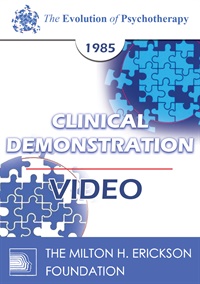Credit available - Click Here for more information
- Average Rating:
- Not yet rated
- Topic Areas:
- Speeches | Couples Therapy | Sex and Sexuality | Intimacy | Marriage | Relationships
- Bundle(s):
- EP17 Video Stream Build a Bundle
- Categories:
- Evolution of Psychotherapy | Evolution of Psychotherapy 2017 | Online Continuing Education
- Faculty:
- Michele Weiner-Davis, LCSW
- Course Levels:
- Master Degree or Higher in Health-Related Field
- Duration:
- 46:30
- Format:
- Audio and Video
- Original Program Date:
- Dec 16, 2017
- Short Description:
- One out of every three couples struggles with mismatched sexual desire---a formula for marital disaster. When one spouse is sexually dissatisfied and the other is oblivious, unconcerned, or uncaring, sex isn't the only casualty; a sense of emotional connection can also disappear. Helping couples bridge the desire gap can be challenging when one spouse appears unmotivated or lacks empathy. This speech presents a collaborative model for partners to work together to turn around the decline in their sex lives and reignite their emotional connection.
- Price:
-
Sale is $29.00
price reduced from Base Price - $59.00
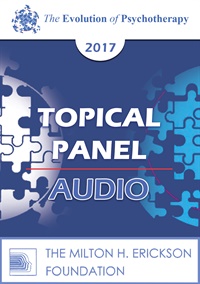
- Average Rating:
- Not yet rated
- Topic Areas:
- Topical Panels | Intimacy | Sex and Sexuality | Couples Therapy | Psychotherapy
- Bundle(s):
- EP17 Audio Streaming Build a Bundle
- Categories:
- Evolution of Psychotherapy | Evolution of Psychotherapy 2017
- Faculty:
- Sue Johnson, EdD | Otto Kernberg, MD | Peter Levine, PhD
- Duration:
- 59:24
- Format:
- Audio Only
- Original Program Date:
- Dec 15, 2017
- Short Description:
- Sex can create intimacy and intimacy can facilitate sexual expression. The intersection between sex and intimacy will be discussed in described from three different perspectives.
- Price:
- $15.00 - Base Price
- Average Rating:
- Not yet rated
- Topic Areas:
- Clinical Presentations | Intimacy | Relationships | Psychotherapy
- Categories:
- Evolution of Psychotherapy | Evolution of Psychotherapy 1985
- Faculty:
- Zerka Moreno
- Course Levels:
- Master Degree or Higher in Health-Related Field
- Duration:
- 58:13
- Format:
- Audio and Video
- Original Program Date:
- Dec 13, 1985
- Short Description:
- Educational Objectives: To understand family structure as perceived by one family member To recognize changes in the structure after treatment
- Price:
- $59.00 - Base Price
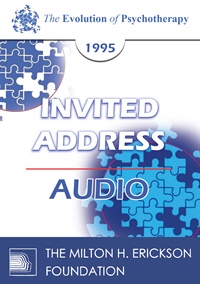
- Average Rating:
- Not yet rated
- Topic Areas:
- Invited Addresses | Object Relations Theory | Intimacy | Psychotherapy
- Categories:
- Evolution of Psychotherapy | Evolution of Psychotherapy 1995
- Faculty:
- James F. Masterson, MD | Cloe Madanes, HDL, LIC
- Duration:
- 1:29:20
- Format:
- Audio Only
- Original Program Date:
- Dec 17, 1995
- Short Description:
- The development and function of the self's capacity for intimacy is described through infancy, childhood and adolescence. The normal process of achieving intimacy is outlined. The illusions of intimacy of Disorders of the Self are then described with detailed clinical presentations of each diagnostic category. The therapeutic interventions necessary to deal with these defenses are then outlined.
- Price:
- $15.00 - Base Price
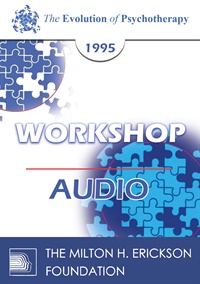
- Average Rating:
- Not yet rated
- Topic Areas:
- Workshops | Rational Emotive Behavior Therapy (REBT) | Intimacy | Psychotherapy | Relationships
- Categories:
- Evolution of Psychotherapy | Evolution of Psychotherapy 1995
- Faculty:
- Albert Ellis, PhD
- Duration:
- 2 Hours 44 Minutes
- Format:
- Audio Only
- Original Program Date:
- Dec 16, 1995
- Short Description:
- This workshop will present cognitive experiential and behavioral techniques to help women and men in their intimate relationships. There will be a special emphasis on personal and work-related male/female relationships and how to deal with negative reactions to "out of role" behavior, such as women's assertiveness and men's expressions of intimacy. Live demonstrations will be offered.
- Price:
- $15.00 - Base Price
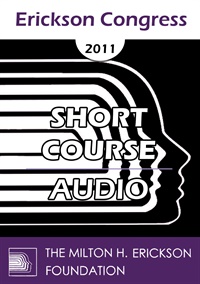
- Average Rating:
- Not yet rated
- Topic Areas:
- Short Courses | Brief Therapy | Couples Therapy | Psychotherapy | Intimacy | Relationships | Solution Oriented Approach
- Categories:
- Erickson Congress | Erickson Congress 2011
- Faculty:
- Robert Johansen, PhD | Ian Johansen, PhD | Todd Gaffney, PhD
- Duration:
- 41:06
- Format:
- Audio Only
- Original Program Date:
- Dec 09, 2011
- Short Description:
- The presentational will introduce a new and brief cognitive model for treating couples. It is a solution-focused model that proposes specific steps on how to differentiate types of love and how these impact an intimate relationship. The participants will develop strategies on how to effectively manage needs in an intimate relationship.
- Price:
- $15.00 - Base Price
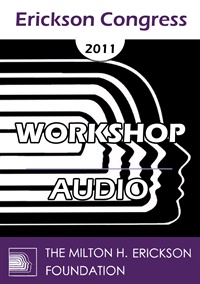
- Average Rating:
- Not yet rated
- Topic Areas:
- Couples Therapy | Hypnosis | Workshops | Affect | Conflict | Intimacy | Relationships
- Categories:
- Erickson Congress | Erickson Congress 2011
- Faculty:
- Carolyn Daitch, PhD
- Duration:
- 1 hour
- Format:
- Audio Only
- Original Program Date:
- Dec 07, 2011
- Short Description:
- This course will present concrete tools and methods of hypnosis to help couples end their habitual conflict escalation. Participants will learn the impact of affect dysregulation on relationships, client-friendly tools to enhance intimacy and connection, and how to rehearse and transfer skills from therapy to real life
- Price:
- $20.00 - Base Price
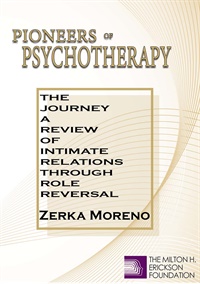
Credit available - Click Here for more information
- Average Rating:
- Not yet rated
- Topic Areas:
- Clinical Demonstrations | Intimacy | Relationships | Psychotherapy | Role Play
- Bundle(s):
- Women Pioneers of Psychotherapy | Pioneers of Psychotherapy Bundle
- Categories:
- Pioneers of Psychotherapy | Evolution of Psychotherapy | Evolution of Psychotherapy 1985
- Faculty:
- Zerka Moreno
- Course Levels:
- Master Degree or Higher in Health-Related Field
- Duration:
- 01:01:00
- Format:
- Audio and Video
- Original Program Date:
- Dec 12, 1985
- Short Description:
- Zerka Moreno (1985) explains the importance of role reversal. She demonstrates with Lori who discusses concerns related to her marriage. She examines her relationship with her father. Lori is asked to create a family structure using members from the audience. Moreno ends by sharing information about her own experiences in Psychodrama.
- Price:
- $59.00 - Base Price
Please wait ...



